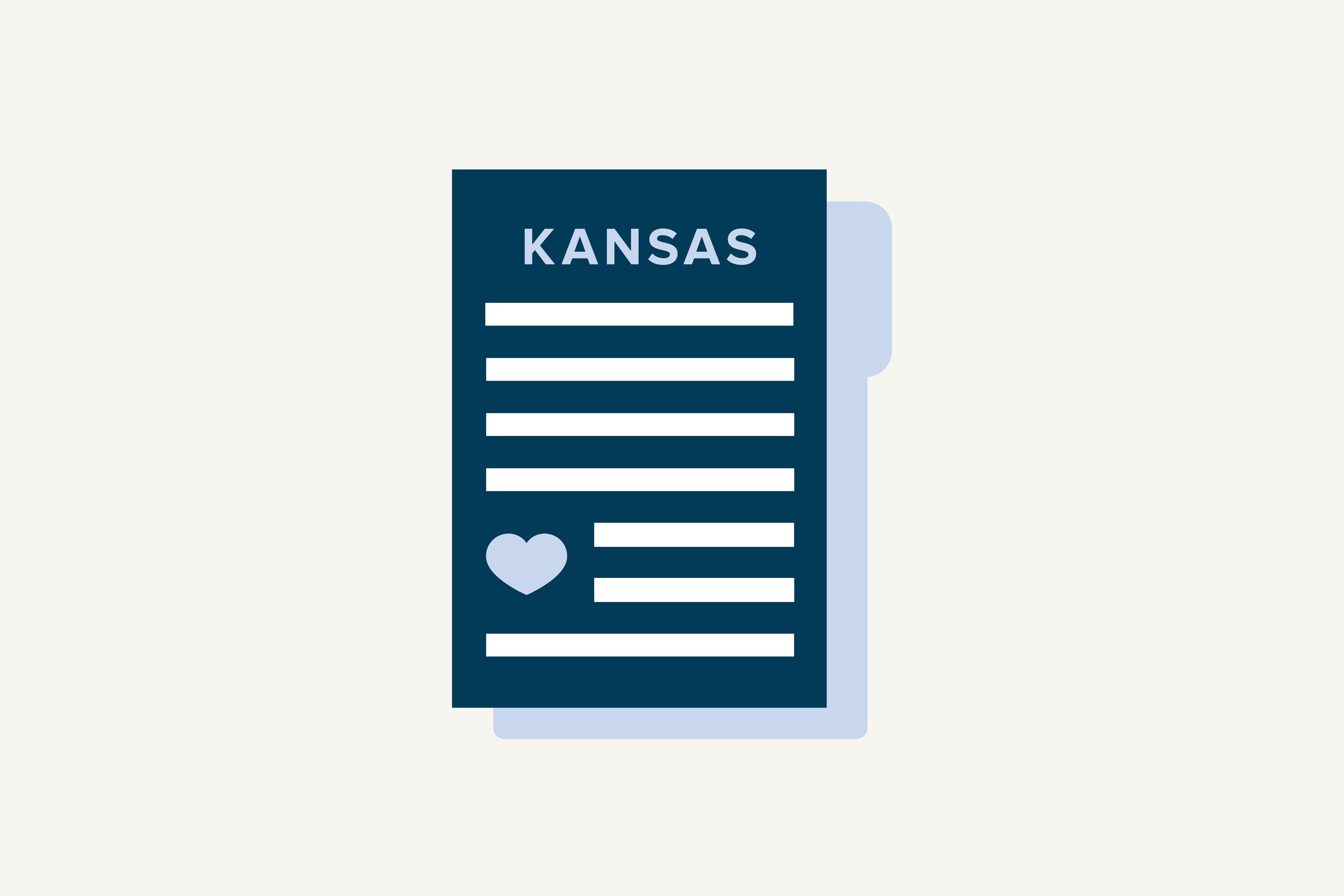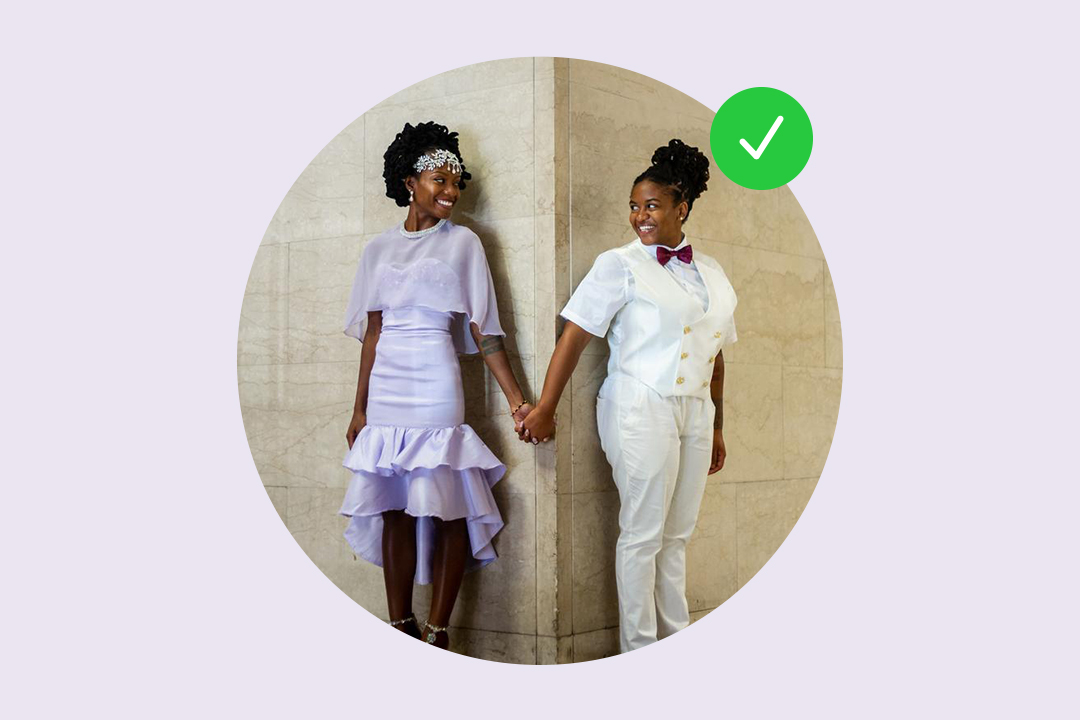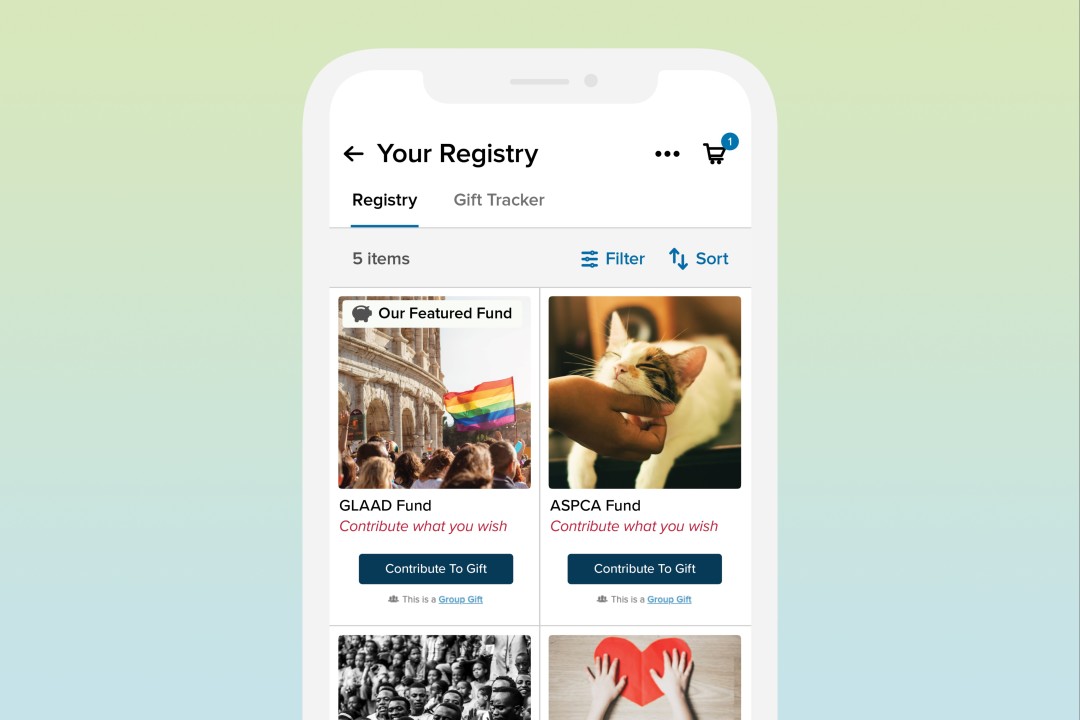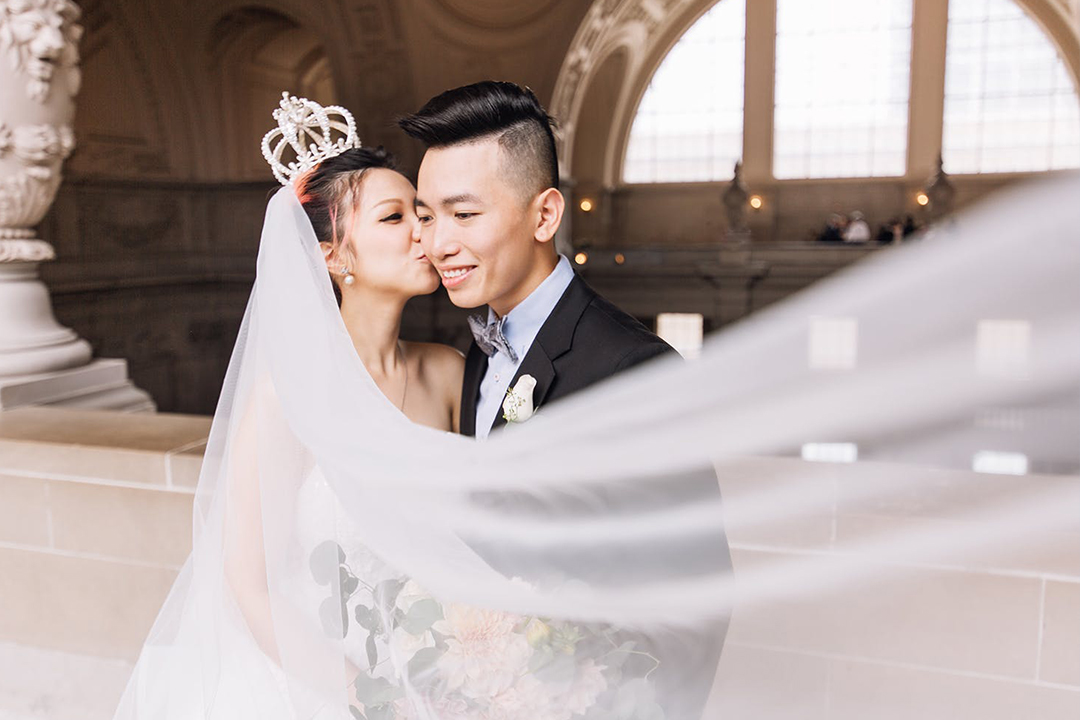- Expert advice/
- Wedding planning 101/
- Legal/
- Kansas Marriage Laws
- Legal
Kansas Marriage Laws
Learn more about Kansas marriage laws and how you can effortlessly plan for your Kansas wedding.
Last updated February 5, 2024

The First Look ✨
- Kansas marriage laws authorize traditional marriages, proxy marriages, and common-law marriages. While traditional and proxy marriages require a marriage license, common-law marriages do not.
- In the state of Kansas, a marriage license expires six months after a county clerk’s approval. Anyone with a marriage license issued from a Kansas county can get married within state lines.
- Kansas marriage laws do not require an officiant to be present at the wedding ceremony; however, they do require two witnesses to be present.
- After a waiting period of two weeks (following the wedding date), couples can order their official marriage certificate online, over the phone, through the mail, or in person.
Before you taste test your seven-layer wedding cake and map out a seating arrangement that expertly considers each guests’ preferences, you and your partner must also expertly map out your state’s marriage laws to properly adhere to Kansas’ marriage requirements.
Marriage is a legal contract, after all. Saying “I do” affects your rights to own property, how you fill out your tax forms, and your plans for retirement. As such, understanding Kansas’ state-specific laws is a critical prerequisite for a happy and savvy marriage.
Marriage Laws and Requirements in Kansas
In general, most of the 50 states adhere to the same general marriage laws and requirements—and Kansas is no different. Each document and prerequisite must be obtained legally through an established system of processes:
-
Marriage License – A marriage license is your golden ticket to walk down the aisle. It’s a legal document that authorizes you and your partner to get married, and must be signed following your wedding ceremony and returned to state records.
-
Marriage License Fees and Requirements – In the United States, marriage licenses typically cost anywhere from $10 to $110. There may also be processing fees involved, depending on how you choose to pay for the license.
-
Waiting Periods – After you submit your application for a marriage license, a county clerk will need to approve or deny the request. This can take anywhere from 24 hours to six months to complete, depending on the state where you register.
-
Blood Tests – The state of Montana still requires you and your partner to undergo blood tests to check for venereal disease, genetic disorders, and rubella before issuing a marriage license. However, in Kansas no blood test is required before you and your partner marry.
-
Residency Requirements – Some states require residency in order to be married within state lines. Luckily, you and your partner do not need to be residents of Kansas to get married within the state.
-
Witnesses – At least two witnesses are required during a marriage ceremony in Kansas. The witnesses must be at least 18 years old, must be present when you say your “I dos,” and must sign your marriage license.
-
Legal Age of Marriage – Those who are 18 years of age or older are free to get married without parental consent. However, those who are 16 or 17 can still get married with the permission of a parent or guardian. A judge can also give consent if both parents are deceased and you are without a legal guardian. Parties who are 15 years old can also get married with judicial consent if the marriage is in the best interest of the individual.
-
Officiant Qualifications – Kansas does not require an authorized officiant to be present during the wedding ceremony. As such, when applying for your marriage license, it’s not required to include the name of your officiant. Instead, two people can get married through a mutual declaration of marriage that aligns with the couple’s religious society or sect. However, if you choose to have an officiant present, the state of Kansas authorizes the following individuals:
-
Ordained clergyman of any religious denomination
-
Judge or justice of a court of record
-
Retired judge or justice of a court of record
-
Municipal judge of any city in Kansas
-
Licentiate of a denominational body
Kansas’s Marriage License Application Process
In Kansas, state laws require couples to visit their district courthouse or apply online for a marriage license. Once you’ve acquired a marriage license from your county, you and your partner can get married anywhere within Kansas state lines, no matter which county your marriage license is issued from.
Types of Licenses Available
Couples getting married in Kansas can acquire a traditional marriage license for a legal marriage that recognizes union between same-sex and opposite-sex partners.
However, Kansas does not allow domestic partnerships—a legal union between unmarried couples in long-term committed relationships. Most couples enter a domestic partnership in order to receive medical and health benefits.
Documents Required
When submitting your application for a marriage license in Kansas, you’ll need to file the online form or paperwork with the Kansas judicial branch. In the application, you’ll need to select the county you wish to issue your license. Following your submission, a district clerk will review your application to either approve or deny your request.
When completing the application, you can include ceremony information, such as the name of the person performing the ceremony, his or her title, and his or her street address.
In addition to your official IDs and social security numbers, the Kansas marriage license application also requires each partner to include the following information:
- Email address
- Parental information and consent, if applicable
- Legal first and last name
- Previous marriage details, if applicable
- Birthplace
- Residency
- Name changes, if applicable
Fees
In Kansas, a marriage license application costs $85.50, but you’ll also be charged a $2.14 processing fee when paying with a credit or debit card and a $1.25 processing fee if paying with an electronic check.
Waiting Period
After you submit your application for a marriage license, Kansas clerks can take anywhere from three days to two weeks to approve or deny the request.
Expiration of License
Once your marriage license is approved, it will be valid for six months, meaning you and your partner will need to meet up at the altar before the license expires.
Registering the Marriage License
In order to validate your marriage license, both partners and the officiant (if you have one) must sign a copy of the license following the wedding ceremony. The marriage license must then be filed with the county clerk of the district court in the county where the license was issued, within 10 days of the ceremony.
At least two weeks after your ceremony, you can request a certified copy of your marriage certificate. In Kansas, a certified copy costs $15 to obtain. To order a certified copy of a marriage license, couples can:
- Visit the Charles Curtis State Office Building – The building is located at 1000 SW Jackson, Ste. 120, Topeka, KS 66612, and is open from 9 a.m. to 4 p.m. on weekdays. Couples must enter through the northwest side of the building. Payment can be made by cash, check, money order, or credit card. Processing time is typically no more than 20 minutes.
-
Request the License Online – If you’d like to avoid the lines, you can order your certified copy online through www.vitalchek.com. Payment must be done by credit card. In addition to the $15 fee, you’ll also be charged an additional $13.95 service fee. Once the order is received, the processing time typically spans three to five business days.
-
Request the License by Phone – You can also call 1-877-305-8315 to order your official certificate. The service is available 24 hours a day, seven days a week. There are also Spanish translators available. Like an internet order, the payment must be made by credit card. You’ll be charged the $15 fee in addition to the $13.95 service fee. The processing time for a phone order is typically three to five business days.
-
Use a Mobile App – Within your phone’s app store, search the term “IKAN,” then select “IKan – State of Kansas.” Payments can be made through the app with a credit card or ACH, an electronic fund transfer. In addition to the $15 fee, you’ll also be charged a $5 processing fee. The certified certificate will be available at will call for a same-day pickup, or you can opt for regular mail, which can take seven to 10 business days to arrive.
-
Use a Mailing Service – You can also send a request through the mail. It’s recommended to use a priority mail service or expedited mail. In the mailed request, you must also include a $15 check or money order. The processing time is largely dependent on the volume of requests, but in most cases, it should take no more than 10 days to receive your order.
Special Marriage Considerations in Kansas
Common-law marriages—an agreement between two parties to marry without a marriage license or ceremony—are also recognized in Kansas if the couple considers themselves marital partners.
There’s no minimum period of cohabitation required for a common-law marriage in Kansas, but they must meet the following requirements:
-
Both parties must have the capacity to agree to marry and cannot be married to someone else. In addition, the parties cannot be closely related and must be over the age of 18.
-
The two parties must have a present agreement to get married, meaning that both partners intend to get married to one another and refer to each other as their spouse in the present, not the distant future.
-
The parties must already presently and publicly live as husband and wife. For example, your community may already view you as a married couple or you may already file joint tax returns.
In a common-law marriage, much like traditional marriage, divorce or death are the only ways to end the union. As such, division of assets, child custody and support, and spousal maintenance apply to common-law marriages, too.
Frequently Asked Questions About Getting Married in Kansas
When it comes to getting married, there are no dumb questions. Plus, you’ve already answered the most important one—yes!
When Should I Start to Apply for a Marriage License in Kansas?
After submitting your application for a marriage license in Kansas, it can take up to two weeks to process and be approved. As such, it’s generally recommended that you submit your application anywhere from three weeks to a month before your wedding date.
However, since a Kansas marriage license is valid for six months, this gives you some extra wiggle room if you’d like to create some buffer between the date of submission and your wedding day.
What’s the Difference Between a Marriage License and a Marriage Certificate?
Your marriage license is the first step toward your marriage certificate. Essentially, a marriage license is an approval from the county clerk stating that you and your partner can legally marry within the state of Kansas. A marriage license is then signed by you, your partner, and the officiant following the wedding ceremony.
After filing the document with the local jurisdiction, you can then order a certified marriage certificate that proves that you and your spouse are legally married.
If I Don’t Live in Kansas, Where Do I File My License?
If you’re planning to get married in Kansas, but don’t live in the Sunflower State—have no fear. Kansas residency is not required to get married in the state. Simply file the license with the county in which your wedding will take place. If on the off chance that you accidentally submit the license to the wrong Kansas county, you’re still in the clear. Once you’re registered within a single county in Kansas, you can get married anywhere within the state.
How Are Marriage Licenses Filed?
It’s the responsibility of the officiant to file your signed marriage license with the appropriate county office. If you do not have an officiant at your wedding, you or your partner must file the marriage license with the district court in which your license was issued.
Are Proxy Marriages Allowed in Kansas?
Yes. In a proxy marriage, someone can stand in for either the bride or groom if they’re unable to be present at the wedding ceremony. In most cases, this type of marriage is reserved for members of the armed forces, but marriages in Kansas, California, Colorado, Texas, and Montana are an exception to the rule.
Proxy marriages are only legal if the couple has obtained a Kansas marriage license.
Proxy weddings are especially beneficial for couples in which one party lives in a different country or state. A proxy marriage will only be accepted in the state of Kansas if one spouse-to-be, one officiant, and two witnesses are present at the ceremony.
How Do I Legally Change My Name After Marriage?
When completing the marriage license application, you’ll need to include your or your partner’s desired name change in the application.
However, if you or your spouse decide to change your name after the application is submitted or following the wedding ceremony, contact the Office of Vital Statistics. If more than 30 days have passed since your wedding ceremony, you will need to file a petition with the district court to request a name change. Most likely, you will need to pay a filing fee.
After changing your name legally, you’ll also need to change your name on your social security card, US passport, driver’s license, and other official documents such as your bank account, insurance information, and credit card.
Getting Married in Kansas: Everything Else You Need to Know
As the saying goes, there’s no place like home—especially if your home is Kansas. From the blooming water lilies of Wichita Gardens to the looming sandstones of Monument Rocks, Kansas is a beautiful place to start your life as a married couple.
When planning your no-place-like home wedding, it’s easy to get caught up in a tornado of to-do lists, DIY projects, and wedding-day finishing touches—oh my! So we went ahead and compiled a list of can’t-miss factors to consider when planning your Kansas wedding:
-
Seasons – Tornado season in Tornado Alley can be a particularly dangerous time to hold your wedding. Typically, May and the beginning of June are the peaks of tornado season in Kansas. As such, avoid scheduling a wedding during the summer months, especially if you’re planning an outdoor wedding, to avoid extreme weather events—and a possible flight to Oz. The best wedding months for an outdoor wedding in Kansas are April, September, October, and November.
-
Venue – When choosing a Kansas wedding venue, you’ll want to consider the theme of your wedding and whether you prefer an indoor or outdoor ceremony. Kansas is a beautiful state, filled with city-slicking architectural marvels, pendulous willow trees, and plenty of barns for the perfect pastoral photo-op. Need a little help finding a venue in Kentucky? Zola’s wedding venue database will help you find your perfect romantic spot for both your ceremony and your reception.
-
Theme – Whether you’re going for bohemian beauty or vintage elegance, intertwine your wedding theme into everything you choose—from bridesmaid dresses to table bouquets. Rustic-chic is especially befitting Kansas’s golden plains—consider adorning your celebration in shabby-chic barnyard themes, such as log place card holders, flower-filled mason jars, and backyard games such as a ring toss, made with old milk bottles.
-
Invitations – Like your table bouquets, your invitations should represent your wedding’s theme—as well as the love shared between you and your partner. Zola offers a charming collection of wedding invitations for every taste—whether you’re going for an elegant celebration or a beachy bash. Each invitation should include vital details, such as the date, time, and location of your reception. You can even consider sending off save the dates to ensure that your guests can plan their travels and lodging ahead of time.
-
Guest Transportation – Kansas’ largest airport, the Dwight D. Eisenhower National Airport, is located in Wichita, which can be hours away from more remote wedding venues. As such, consider providing your out-of-state guests with wedding transportation to your venue as an added thank you for attending your wedding day festivities.
-
Vendors – Forget the wedding dress—some of us dream of the wedding day for the food. Can you say fondue fountain? While some wedding venues do not allow separate vendors, others do. If you’re in the position to hire your own cheese-wielding chefs, find the perfect fit with Zola’s wedding vendor registry. Each vendor is pre-screened to give you some peace of mind.
Plan an Ideal Kansas Wedding at Zola
With the right information under your belt, planning and authorizing a Kansas wedding is a piece of cake.
Before embarking on your fun-filled wedding-day planning (put down the scissors and glitter), it’s important to understand the legal requirements of marriage: acquire a marriage license, unless pursuing common-law, be of legal age, and make sure that you sign the marriage license and order your marriage certificate following the ceremony.
Once you’ve figured out the legal logistics, enlist the help of Zola for the fun stuff.
Zola is your all-in-one assistant to all things wedding planning, from personalized wedding invitations right down to your meticulously chosen wedding registry for your matrimonial digs.
Think of Zola as your own personal Glinda the Good Witch—but with less glitter. We’re here to help—and with the proper planning, you’re sure to have guests whispering, “I don’t think we’re in Kansas anymore.”
Up next for you

Courthouse Wedding Checklist
How-To
If a big reception with all the bells and whistles isn’t your speed, consider this courthouse wedding checklist for a simple yet sweet ceremony.

Charitable Wedding Registry
How-To
Ditch the traditional gifts and start off your relationship in a meaningful way with a charitable wedding registry. Read on and find out how to do it.

How to Plan a Wedding: A Step-by-Step Guide
How-To
We’ll walk you through the steps of online wedding planning, highlighting all of Zola’s incredibly easy and intuitive online wedding planning tools that’ll make planning for the big day more fun and less frustrating.

12 Save the Date Design Ideas
How To
Need some Save the Date design ideas to get the imagination flowing? We’re here to help.
Featured

8 Top Advice for Engaged Couples Before Tying the Knot
Advice
Getting ready to walk down the aisle? Review this top advice for engaged couples before saying your “I dos!” Read on now.

When to Make a Wedding Registry and Share It
Advice
Timing is everything. Announce your wedding registry like a pro with these guidelines of how and when to start your wedding registry.

Wedding Insurance Resources for the Happy Couple
Inspiration
Learn how wedding insurance can protect you from unforeseeable mishaps or accidents. Read about different policies and decide what’s right for your wedding.
- Expert advice/
- Wedding planning 101/
- Legal/
- Kansas Marriage Laws
Find even more wedding ideas, inspo, tips, and tricks
We’ve got wedding planning advice on everything from save the dates to wedding cakes.
